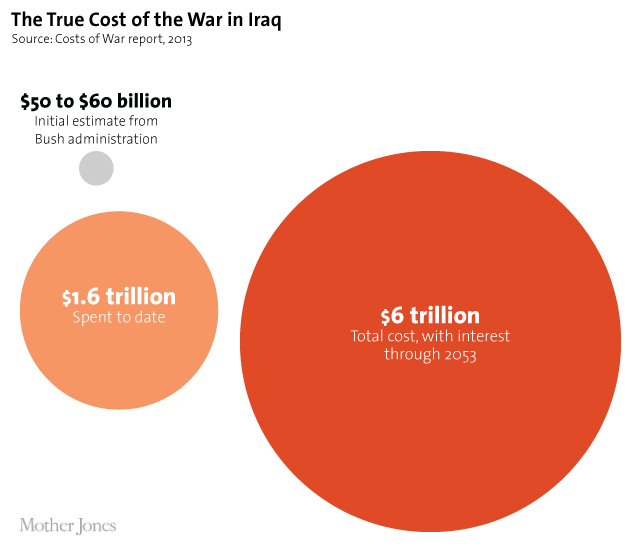Total cost of Iraq invasion and occupation estimated at $6 trillion – Study finds costs of U.S. wars linger for over 100 years
By Tasneem Raja
19 March 2013 (Mother Jones) – Ten years later, the Bush administration’s projected price tag for the war in Iraq seems downright cute. According to the first-ever comprehensive count of the true toll of the combined wars, the estimate the administration used to sell the invasion in 2003 was about 100 times too low. So what did that $6 trillion get us, exactly? Since we borrowed to pay for much of the war, we’re facing nearing $4 trillion in cumulative interest between now and 2053, according to the 30 researchers who worked on the Costs of War report for Brown University’s Watson Institute for International Studies. To date, according to the report, medical and disability claims of U.S. war veterans of Iraq have reached $84 billion; ongoing care for wounded Iraq war vets and their families is expected to require nearly $500 billion more over the next several decades. Homeland Security got $245 billion in additional funding thanks to increased threats of terror—real, imagined, and staged—over the last ten years. On-the-ground operations alone ended up being 16 times more expensive than the Bush cabinet’s original estimate for the entire enterprise. Apparently the Office of Management and Budget was really, really bad at math for a while there in 2003. [more]
Charts: Bush Lowballed Us on Iraq by $6 Trillion

By Mike Baker
19 March 2013 OLYMPIA, Washington (AP) – If history is any judge, the U.S. government will be paying for the Iraq and Afghanistan wars for the next century as service members and their families grapple with the sacrifices of combat. An Associated Press analysis of federal payment records found that the government is still making monthly payments to relatives of Civil War veterans — 148 years after the conflict ended. At the 10 year anniversary of the start of the Iraq war, more than $40 billion a year are going to compensate veterans and survivors from the Spanish-American War from 1898, World War I and II, the Korean War, the Vietnam War, the two Iraq campaigns and the Afghanistan conflict. And those costs are rising rapidly. U.S. Sen. Patty Murray said such expenses should remind the nation about war’s long-lasting financial toll. “When we decide to go to war, we have to consciously be also thinking about the cost,” said Murray, D-Wash., adding that her WWII-veteran father’s disability benefits helped feed their family. Alan Simpson, a former Republican senator and veteran who co-chaired President Barack Obama’s deficit committee in 2010, said government leaders working to limit the national debt should make sure that survivors of veterans need the money they are receiving. “Without question, I would affluence-test all of those people,” Simpson said. With greater numbers of troops surviving combat injuries because of improvements in battlefield medicine and technology, the costs of disability payments are set to rise much higher. The AP identified the disability and survivor benefits during an analysis of millions of federal payment records obtained under the Freedom of Information Act. To gauge the post-war costs of each conflict, AP looked at four compensation programs that identify recipients by war: disabled veterans; survivors of those who died on active duty or from a service-related disability; low-income wartime vets over age 65 or disabled; and low-income survivors of wartime veterans or their disabled children. The Iraq wars and Afghanistan So far, the wars in Iraq, Afghanistan and the first Persian Gulf conflict in the early 1990s are costing about $12 billion a year to compensate those who have left military service or family members of those who have died. Those post-service compensation costs have totaled more than $50 billion since 2003, not including expenses of medical care and other benefits provided to veterans, and are poised to grow for many years to come. The new veterans are filing for disabilities at historic rates, with about 45 percent of those from Iraq and Afghanistan seeking compensation for injuries. Many are seeking compensation for a variety of ailments at once. Experts see a variety of factors driving that surge, including a bad economy that’s led more jobless veterans to seek the financial benefits they’ve earned, troops who survive wounds of war and more awareness about head trauma and mental health. Vietnam War It’s been 40 years since the U.S. ended its involvement in the Vietnam War, and yet payments for the conflict are still rising. Now above $22 billion annually, Vietnam compensation costs are roughly twice the size of the FBI’s annual budget. And while many disabled Vietnam vets have been compensated for post-traumatic stress disorder, hearing loss or general wounds, other ailments are positioning the war to have large costs even after veterans die. [more]

Just make the Iraqi's pay for it. It was their oil after all that we went after. Saddam Hussein wasn't responsible for 9/11, but he did have oil. Maiming and murdering a million Iraqi's was the price. So let's just roll through this "all the way" and make Iraq pay for their own destruction by stealing everything else that's left (the remaining oil, national treasures and anything else we can rip off).
America is VERY good at this sort of thing, having absolutely ZERO moral compass. THEY'VE GOT IT – LET'S STEAL IT.
Making war is what we do, the most evil fucking empire on the entire planet.
I often wish that some country would shut us down by decapitating our horrifying "leadership" with a suitcase nuke or something.
I'd stand up a cheer.
I had no idea that the US government is still paying for wars that happened so many years ago. Thanks for sharing this information. Very enlightening.